
The Divergent Trilogy by Veronica Roth stands out as one of the most influential young adult dystopian series of the 2010s, capturing readers with its intense world-building, complex characters, and exploration of identity, courage, and societal control. Comprising Divergent, Insurgent, and Allegiant, the series unfolds in a futuristic Chicago where society is divided into five factions—Abnegation, Erudite, Dauntless, Amity, and Candor—each representing a different virtue. At the center of this fractured world is Beatrice “Tris” Prior, a sixteen-year-old who learns she is Divergent, meaning she doesn’t fit neatly into one faction. This discovery not only threatens her personal safety but ultimately leads her to uncover a deeper conspiracy that questions the very structure of their society.
In Divergent, the first book, readers are introduced to Tris’s internal conflict as she abandons her Abnegation upbringing to join the daring Dauntless. The novel’s strength lies in its thrilling initiation scenes, rich with physical trials and psychological challenges, and in its slow-burning relationship between Tris and her instructor, Four. Roth’s writing is direct and fast-paced, suited to the genre, yet manages to build emotional depth as Tris grapples with her identity, guilt, and burgeoning love. The dystopian setting echoes Orwellian themes while giving it a distinctly adolescent twist, emphasizing personal choice and bravery in the face of conformity.
Insurgent picks up immediately after the events of the first book, deepening the political intrigue as the faction system begins to collapse. This installment focuses more on the chaos resulting from faction warfare and the shifting alliances between characters. While it maintains the action-packed momentum, it also dives deeper into Tris’s trauma and internal struggles following major losses. Some critics found the plot less cohesive than the first, but Roth's attempt to tackle post-traumatic stress, moral ambiguity, and the burden of leadership adds complexity to Tris’s character. The evolving dynamic between Tris and Four also becomes more strained and realistic, reflecting the pressures of rebellion and conflicting ideals.
The final book, Allegiant, is perhaps the most divisive. Here, Roth breaks from the first-person Tris-only perspective and alternates chapters between Tris and Four, allowing readers insight into both characters' minds. This narrative choice initially received mixed reactions, but it ultimately provides a fuller picture of their relationship and individual transformations. Allegiant also reveals the true origin of the faction system and the city's isolation, adding a layer of social commentary about genetic manipulation and systemic control. Roth uses this backdrop to examine broader questions about human nature, free will, and sacrifice.
The conclusion of the trilogy shocked many readers with its bold narrative choices, particularly the fate of its protagonist. Roth took a risk by ending the series in a way that defies the typical heroic arc, offering instead a message about selflessness, truth, and legacy. While some fans were outraged, others appreciated the emotional weight and thematic consistency of the finale. Regardless of opinion, it's hard to deny that Roth made a lasting impact on the YA genre by refusing to compromise her story’s core values for comfort or predictability.
One of the series' standout qualities is its handling of moral complexity. Unlike other YA dystopias where the line between good and evil is clearly drawn, The Divergent Trilogy thrives in gray areas. Characters often act out of fear, confusion, or conflicting loyalties, and even Tris is not portrayed as a perfect heroine. Her strength lies not in her invincibility but in her willingness to confront hard truths and question herself. Similarly, Four’s vulnerability and struggle with his abusive past add depth to a character who could have easily become a typical stoic love interest.
The series also excels in its depiction of female strength. Tris is not only physically capable but intellectually and emotionally strong. She resists being defined by others’ expectations and learns to trust her instincts, even when doing so isolates her. Roth doesn’t glamorize Tris’s journey—it’s painful, full of loss, and often messy—but that’s what makes it resonate. In a literary landscape filled with flawless heroines or over-the-top rebels, Tris stands out for her relatability and grounded resilience.
Of course, the trilogy is not without its flaws. Critics have pointed out inconsistencies in world-building and occasionally underdeveloped secondary characters. The pacing, particularly in Insurgent and Allegiant, can waver between breakneck and sluggish. However, the emotional intensity and philosophical undercurrents often compensate for these structural issues. Roth’s prose, though not lyrical, is effective and immersive, especially for its target audience.
The Divergent Trilogy remains a benchmark in the dystopian YA genre, appealing to both teenagers and adults drawn to narratives about rebellion, self-discovery, and moral courage. It sparked major conversations about choice versus destiny, societal engineering, and personal responsibility. Its influence extended beyond the page with successful (though uneven) film adaptations and a dedicated fanbase that continues to engage with its themes years after publication.
In the end, The Divergent Trilogy is more than just an action-filled saga set in a dystopian world. It's a story about choosing who you are, even when the world wants to decide for you. It's about questioning the systems that shape us and daring to break them. Veronica Roth crafted a trilogy that didn’t just follow a trend—it helped define one.